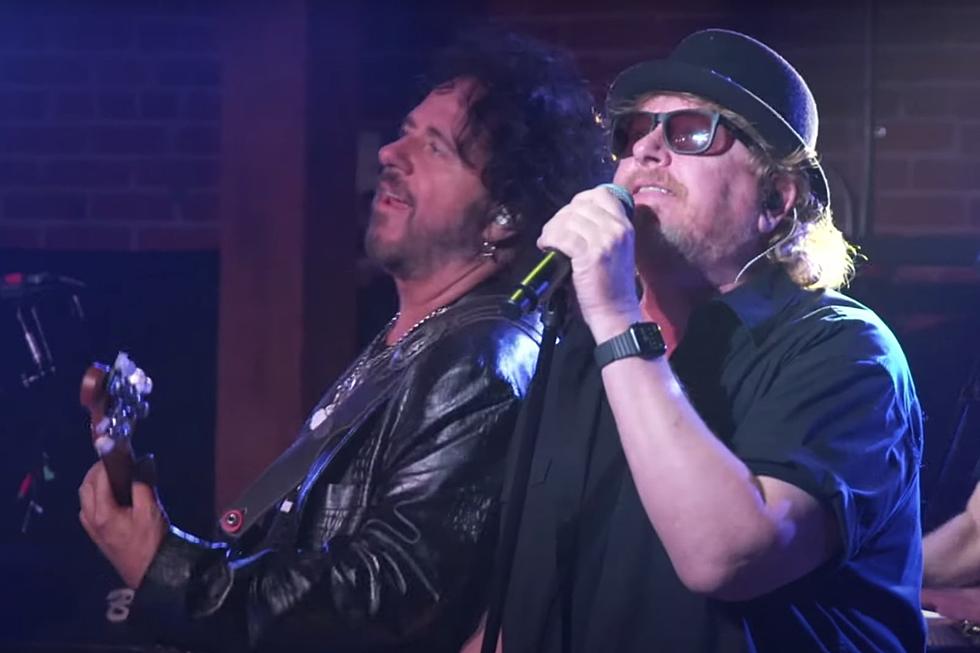
How Toto Surprised Everyone With the Multi-Platinum ‘Toto IV’
After landing in the Top 10 with their self-titled 1978 debut album, Toto suffered a steep sales slide with their next two releases. As they entered the studio to record their fourth album, Toto IV, the band members knew if they didn't deliver a hit, they were probably out of a record deal.
"The record company was like, 'Okay, guys. We let you do what you want to do. Are you gonna give us a hit record? Because if you don’t, we’re gonna drop you,'" guitarist Steve Lukather later recalled of the period following 1981's Turn Back LP. "We just said, 'You know what? We’re gonna do what we do well.'"
What that meant was that after — as Lukather put it — straining to "prove we were an arena rock band" with Turn Back, the group doubled down on its knack for lush production and radio-ready melodies while making the follow-up. With most band members contributing to the songwriting, and a budget that allowed for cutting-edge studio technology and a small army of outside musicians, the record that would ultimately be known as Toto IV started to take shape.
Tracking throughout 1981 and into early 1982, the group balanced its commitment to its own music against the band members' increasingly busy session schedules. As they had throughout the mid-to-late '70s — and would continue to do until the mid-'90s — the players in Toto's lineup contributed to countless hit records by other artists; in 1982 alone, they'd later be heard on Chicago 16 and Michael Jackson's Thriller. None of it, however, distracted them from their goals for Toto IV.
"We just decided to kill that one, and we did. We were really proud of it," Lukather told Ultimate Classic Rock. "We had the full London strings — we just went, 'Fuck this, we’re gonna go for it with the biggest, most obnoxiously overproduced record of all time.' And it turns out that’s what we do best."
Lukather's self-deprecating summary aside, Toto IV was only as overproduced as the material demanded. With so much musical talent in the lineup, the band's songs could be complicated, but rarely overtly so; as with the production, all the moving parts worked to support the end result. A perfect case in point is "Africa," the closing track and third single, which topped the Billboard Hot 100 in early 1983 on the strength of a moodily insistent groove painstakingly assembled by Jeff Porcaro. Listen casually, and it's a perfectly pleasant pop song with a memorable, soaring chorus. It's only when you lean in a little closer that it becomes obvious how much is going on.
Listen to Toto's "Africa"
Fortunately for Toto's record contract, millions more started listening after Toto IV's arrival on April 8, 1982. Led off by first single "Rosanna," the record surpassed the commercial heights the band had scaled with the Toto LP, ultimately sending four songs into the U.S. Top 40 on its way to six Grammy wins and more than 12 million in worldwide sales. At a time when many music fans were already listening to the members of Toto whether they knew it or not, the group exploded into a superstar act in its own right.
Hard as they'd worked to reach the top, the band found that momentum even more difficult to hold onto. Although Toto IV boasted impressive staying power on the charts, where it continued to send singles into the following year, the group's original lineup was already falling apart. Bassist David Hungate was gone even before the album campaign started in earnest, and while the group had Mike Porcaro waiting in the wings to step in, they'd shortly face a much more complicated loss with the departure of Bobby Kimball.
"He kind of imploded," Lukather later said of Kimball, who — to be fair — was as guilty of indulging in the same unhealthy lifestyle as anyone else in his circle, or the major-label music industry as a whole at the time. Yet as Lukather pointed out, singers run a greater risk of damaging their instrument, and when they've been burning the candle at both ends, it's often a lot easier to tell.
"It affects the thing they need to do their job. I mean, if I sandpapered my fingers off and showed up to the gig unable to play, they would have chucked me a long time ago, you know what I mean? We’ve all done stupid things, but for us at that moment, it was just crushing," he added. "We thought we were going to survive the Hungate loss, but when you have a singer with a voice people recognize, and then you have to go back to the drawing board at the height of your career ... that was a really fucked-up thing to do to us."
All told, Toto IV would prove to be an all-but impossible act to follow for the group — at least in terms of their sales, which dwindled in the U.S. with subsequent releases. But through decades of changes on the charts and in the band, they've remained in demand around the world, and with the exception of a brief breakup between 2008-'10, they've stayed creatively active all along. Unlike some bands whose biggest hits become an albatross, the members of Toto remain justifiably proud of what they accomplished with this album.
"I remember listening back to it and thinking, 'I think we have something here, guys,'" Lukather recalled. "It turned out great. I’m still proud of that album. We had no idea it was going to turn into what it did; we were just trying not to get kicked off the label."
Ranking Every Toto Album
More From Kool 107.9










